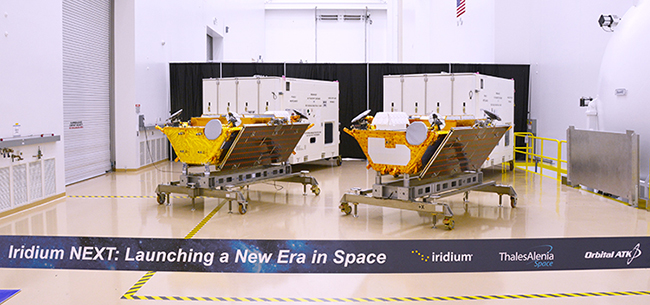Chandler-based satellite manufacturer Orbital ATK finished the first two of 70 satellites that are being manufactured for Virginia-based Iridium Communications Inc. to replace its current satellite network in orbit.
[espro-slider id=197985]
Photos courtesy of Iridium
Orbital ATK is assembling and testing the replacement satellites of Iridium’s existing network, which will be launched and rolled out incrementally over the next few months by Elon Musk’s SpaceX.
“This is a really exciting milestone. After more than seven years of effort, the first of our next-generation satellites are finally ready for space,” said Matt Desch, CEO at Iridium.
The satellites will be launched into base starting September 12th, Desch said. SpaceX will launch the satellites from Vandenberg Air Force Base in California. The new satellite system is launching 19 years after Iridium’s first satellite system.
Over the next 18-months Orbital ATK will be assembling and testing 70 satellites for the new fleet of satellites, Iridium NEXT. Each SpaceX launch will send ten satellites into the Earth’s orbit, and Orbital ATK plans to finish the first batch by the end of July, and already has two more nearly complete.
“Pretty soon, one satellite a week will go out this factory door.” said Frank Culbertson, executive vice president and president for the Space Systems Group at Orbital ATK.
The entire satellite program costs about $3 billion. A couple hundred million of that cost was spent in Arizona with Orbital ATK, said Desch, Iridium’s CEO.
Iridium contracted France-based Thales Alenia Space to design the satellites, while Thales Alenia subcontracted Orbital ATK to manufacture the new fleet.
Culbertson said 120 employees are working on the Iridium satellite fleet.
Orbital ATK is using a unique manufacturer process for satellites, by building them in an assembly line fashion. Each satellite moves among 18 stations where it is assembled and tested before heading out.
“One (satellite) a week is an amazing achievement for satellite production. It’s something new, but something people are striving for in the future,” Culbertson said.




